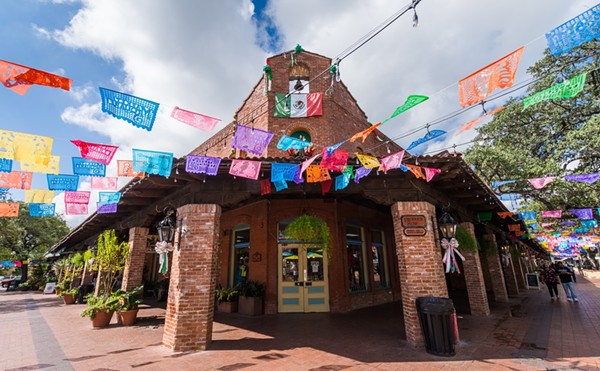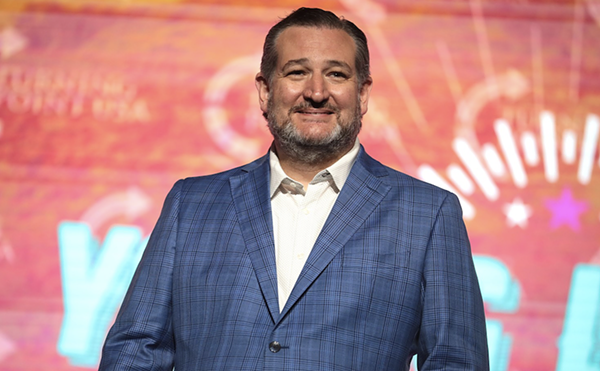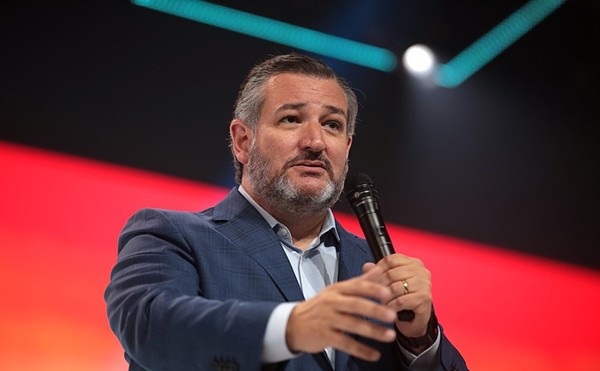The Mashup
Wed, Aug 8, 2007 at 12:00 am
I’m sure you’ve found that any sort of free time is at a premium now.
Boy, isn’t that the truth. Even when I go powder my nose, I’ve got to continue to work.
Let’s talk about why you would want to take that on. The page where you announce that you’re running, you refer to the American Revolution. Do you feel like we’re at another revolutionary moment in our history?
No, I think it’s just inherent in us as Americans that when stuff is off-kilter, that each and every one of us is duty-bound to stand up and say so. The same is true you could say with the Battle of the Alamo — you got people that drew a line in the sand and said, hey, we’re headed in the wrong direction, and we’re gonna stand up and say so.
I think the Alamo is a sort of complicated symbol for a lot of Mexican-Americans. On the one hand it stands for independence, and all those great values, and on the other hand, I think some people feel well, in retrospect, Mexico wasn’t treated very well in all of that.
Well, you were thinking what you were thinking. `Laughter.` But if you’ll recall, do you remember what the year on the flag was?
Remind me.
It’s 1826, the flag that was flown. And you remember why they flew that flag with that particular year on it is because the government was in violation of the constitution. So you had a dictator that was not adhering to the tenets of the constitution, so you had folks standing up against that.
Since we’re talking dictators, let’s come back to the things you feel are out of whack right now. You mention ...
I certainly hope you’re not gonna quote me as referring to the Commander in Chief as a dictato ... we’re not doing that are we?
No, absolutely not. That was a reference I made, not a reference you made.
OK, good.
One of the things you mention on your website that you think is out of whack is the war on terror.
Well, first and foremost on the war on terror, we lost focus from actually curbing the war on terror, or at least dealing with the component of the war on terror that we currently face, the operational aspect. What I mean by that is, we took our eye off the ball when we were in Afghanistan. One of my colleagues in the House used to like to say, you got to kill the snake while you’ve got the hoe in your hand, and we took our eye off the ball in Afghanistan, we lost focus, we had this unilateral effort in Iraq, and now what’s happened is that the command and control component of al Qaeda has been allowed to reconstitute. Now, have we made the problem better or worse? I think the latest intelligence report that was just issued two weeks ago talks about that the problem is worse.
Here’s one thing that’s really important to note: Whenever we declare as a nation a war on something — the war on drugs, the war on poverty, the war on homelessness — when you say it’s a war on something, that means it is something that will continue that you don’t ever quite completely eradicate. It’s kind of like, you don’t know when another Timothy McVeigh is gonna pop up; those things occur unfortunately in our society. However, when we’re dealing with a particular element of a fundamentalist group that wants to do away with what we believe, who we are, how we function, then there are ways to deal with that particular radical element. There have been papers that have rightly talked about — and I’m kind of getting off into, I don’t know if you wanted this much or not ...
Absolutely. Keep going.
You know, it is not gonna be a Western fix to an Islamic problem. It has to be an Islamic fix to an Islamic problem. What that means then is we have to support efforts to resource and support those moderate efforts within their own arena, with the emphasis on the education of women, the push for more secular religious teaching, the push for more moderate Islamic organizations, so that they can then work on eradicating this Islamic fundamentalism which is really at odds with the rest of the world.
So would you say any religion can have a more radical element to it, so it’s not that you think all of Islam is a problem ...
Oh, without question. In fact, it is pretty well fact-driven that `non-`monotheistic societies function better than when you have these monotheisms that try to eradicate everyone else. In this country and in other countries, the tolerance for multiple religions is what allows for people to live in peace and harmony. But when you do have these monotheisms, there is a lot of research that suggets they try to take everybody else out.
A theocracy as opposed to a pluralistic society, a pluralistic society is more peaceful.
Correct. In fact the more we push in some ways, the more we embolden those that are on the extremes of that particular religion, we make them stronger in some ways. So we’ve got to support through — not unilaterally, but with the international community, because it’s an international problem, whether it’s in France, Italy or, hell, London, you know just a few weeks ago. Or Japan, wherever — we’ve got to internationally approach a full-court press in allowing those within the Islamic faith to help curb this fanaticism.
You spent time in Afghanistan, post-9/11. What is your perception of Pakistan and their role?
It’s interesting. I think without question in that particular area of Afghanistan, or rather Pakistan, they’ve been harboring those elements of al Qaeda. Actually, they wanted their own independence in those areas. But Pakistan, if you look back when the post-Soviet Union fled Afghanistan, it was Pakistan that was really pushing the Taliban and supporting the Taliban.
There was a point at which we thought the Taliban looked like a pretty good alternative to the Soviet Union.
Well, at that point we were in favor of anyone over the Soviet Union ... if you look we got diverted after the Soviets fled into the first Gulf War. So when that whole restructuring of governments occurred there, that was not on our front burner any longer.
Some of the problem is this notion of anybody but this guy. You get so focused on one group as your enemy that you’re not very careful about the alliances you’re forming, or the other problems you might be creating in your wake. Is that part of what’s happening with us in the Middle East now? We’re making enemies of people that weren’t and didn’t need to be our enemies.
Yeah, it’s a mess, and it’s historic and it’s cultural, and it’s complicated. I had an extensive visit with some folks from the Israeli consulate on this very issue with the threat of Iran and their nuclear weapons and what that means to destabilizing the region. We’re kind of in quicksand right now, which does limit our I believe effectiveness and credibility in the region. Our international behavior during this administration — that is essentially Bush-Cheney-Rumsfeld-Rove-Cornyn, the whole family — has just botched our international standing and our credibility.
How do you think we should be approaching Iran?
We’ve got to do everything we can, along with moderate Arab countries and folks in the region and Israel to stop them from producing nuclear weapons. Look, during this last eight years, the North Koreans have nukes now, Iran has nukes. It doesn’t sound like we’ve done too well, and I think it’s a very dangerous situation. It’s dangerous for Israel, it’s dangerous for the Arab Emirate, it’s dangerous for all those that are in the range of Iran.
It doesn’t sound like you think a constructive relationship can be built with Iran right now.
The problem is that they’re buying time right now, they’re playing a stall game. And our problem as Americans is that our credibility isn’t quite up to snuff ... there has to be an international effort, there needs to be an economic crackdown so that they don’t proceed, there has to be a lot of international pressure. And if we go it alone like we have in the past, I think it’ll turn out poorly.
Let’s talk about an international situation closer to home. You also spent time down on the `Texas-Mexico` border. Is there really a security threat on the border, or is it purely an economic issue with illegal immigration.
There is a security threat on the border, without question. It is predominantly criminal-activity driven: human trafficking, drug-trafficking, the economics of those is just extremely powerful and there are bad people doing bad things. During my tenure, we were working with Border Patrol, we were a part of the seizure of way over 10,000 pounds of marijuana, I don’t know how much cash, and I don’t know how many hundreds of pounds of cocaine. As a sovereign nation our first duty as a government is to keep our people and their property safe.
Now what happens I think is that the current leadership — President Bush, Cheney, Rove, Cornyn — they choose to deal with the issue — maybe I wouldn’t evn put the President in that quite frankly, because he has made attempts in a bipartisan way to fix it, to fix an old law that no longer fits us in 2007. Then you have the junior senator from Texas, in the time he’s had the opportunity to show leadership, chooses to be a partisan versus a statesman. I believe at a macro level it is the philosophy of leadership of either maintaining power or acquiring more power politically by dividing people versus a philosophy of uniting people for the common good, and that’s where we are just diametrically opposed. If you’ll recall, two years ago, or whenever the last election cycle was, Karl Rove went before the Republican leadership in some venue and declared that if Democrats wanted to make the war the issue for the election cycle, bring it on. Well, they did, and the voice of the poeple was heard, and `the Republicans` lost in the Senate and the House a number of seats.
Now, it is my view, because the war still is, and should be, a primary concern — and why? Because we still have every day you pick up the paper men and women dying, military families that are suffering the significant load of this effort, you have the destabilization of the Middle East and so forth — and so what then does the `Republican` leadership do? They start beating the pots and pans on immigration to change the subject on an issue that is very emotional for the purpose of dividing us as Americans.
I find that irresponsible, because that issue that we agree is broken is an issue that rational people can sit down and get out the other end of working the problem. The problems are those issues dealing with border security, curbing the criminal activity and those migration patterns, dealing with unlawful employers, recognizing that this country is getting ready to retire maybe 60 million baby boomers, and we’re gonna need people to do work, recognizing the issue that you’ve got 12 million peope here that are not going anywhere — you’re not going to load them up on boxcars. Mr. Cornyn has suggested some type of touch-back provision, which will further drive people into the shadows. Most recently in today’s paper he talked about trying to go after people who have violated visas. There are people in that category that are among those 12 million that have been here an extremely long time which means then that you’re going to separate families, you’re going to take mothers and fathers away from their children.
You’ve got the issue that has not been addressed in my view, which deals with the supply aspect of the labor market. You’ve got this migration pattern going on from south to north all over the world, from poor to rich. When you have such a disparity in economies as we have in this hemisphere — and I believe part of our foreign policy in terms of the aid dollars that we provide should be in a hemispheric way with other folks in the area that much like a Marshall Plan — or a Noriega Plan — that would look at ways, not through the government, non-government organizations within the hemisphere to put those dollars into infrastrcture, work jobs, in Mexico, in Central America, that allows for someone then to work on building roads, hospitals, clinics, schools, to work with dignity. They may not be able to make the same amount of dollars they would make here, but they would be able to make a decent living where they would certainly be influenced not to leave their family, not to take a life-threatening trip.
I think we thought NAFTA was going to fix that for us. That was part of the selling point ...
That was part of the selling point. For whatever reason, and that’s part of the issue in those countries, the trickle efect didn’t quite trickle. And that’s why I’m saying you can’t do this kind of effort through the government, because the dollars will get stuck upstream.
So you’re suggesting private economic development, but also the participation of nonprofit development agencies?
I’m thinking an NGO within a hemispheric context. These are ideas that I think Democrats and myself and Republicans can sit down and work through to get out the other end.
Boy, isn’t that the truth. Even when I go powder my nose, I’ve got to continue to work.
Let’s talk about why you would want to take that on. The page where you announce that you’re running, you refer to the American Revolution. Do you feel like we’re at another revolutionary moment in our history?
No, I think it’s just inherent in us as Americans that when stuff is off-kilter, that each and every one of us is duty-bound to stand up and say so. The same is true you could say with the Battle of the Alamo — you got people that drew a line in the sand and said, hey, we’re headed in the wrong direction, and we’re gonna stand up and say so.
I think the Alamo is a sort of complicated symbol for a lot of Mexican-Americans. On the one hand it stands for independence, and all those great values, and on the other hand, I think some people feel well, in retrospect, Mexico wasn’t treated very well in all of that.
Well, you were thinking what you were thinking. `Laughter.` But if you’ll recall, do you remember what the year on the flag was?
Remind me.
It’s 1826, the flag that was flown. And you remember why they flew that flag with that particular year on it is because the government was in violation of the constitution. So you had a dictator that was not adhering to the tenets of the constitution, so you had folks standing up against that.
Since we’re talking dictators, let’s come back to the things you feel are out of whack right now. You mention ...
I certainly hope you’re not gonna quote me as referring to the Commander in Chief as a dictato ... we’re not doing that are we?
No, absolutely not. That was a reference I made, not a reference you made.
OK, good.
One of the things you mention on your website that you think is out of whack is the war on terror.
Well, first and foremost on the war on terror, we lost focus from actually curbing the war on terror, or at least dealing with the component of the war on terror that we currently face, the operational aspect. What I mean by that is, we took our eye off the ball when we were in Afghanistan. One of my colleagues in the House used to like to say, you got to kill the snake while you’ve got the hoe in your hand, and we took our eye off the ball in Afghanistan, we lost focus, we had this unilateral effort in Iraq, and now what’s happened is that the command and control component of al Qaeda has been allowed to reconstitute. Now, have we made the problem better or worse? I think the latest intelligence report that was just issued two weeks ago talks about that the problem is worse.
Here’s one thing that’s really important to note: Whenever we declare as a nation a war on something — the war on drugs, the war on poverty, the war on homelessness — when you say it’s a war on something, that means it is something that will continue that you don’t ever quite completely eradicate. It’s kind of like, you don’t know when another Timothy McVeigh is gonna pop up; those things occur unfortunately in our society. However, when we’re dealing with a particular element of a fundamentalist group that wants to do away with what we believe, who we are, how we function, then there are ways to deal with that particular radical element. There have been papers that have rightly talked about — and I’m kind of getting off into, I don’t know if you wanted this much or not ...
Absolutely. Keep going.
You know, it is not gonna be a Western fix to an Islamic problem. It has to be an Islamic fix to an Islamic problem. What that means then is we have to support efforts to resource and support those moderate efforts within their own arena, with the emphasis on the education of women, the push for more secular religious teaching, the push for more moderate Islamic organizations, so that they can then work on eradicating this Islamic fundamentalism which is really at odds with the rest of the world.
So would you say any religion can have a more radical element to it, so it’s not that you think all of Islam is a problem ...
Oh, without question. In fact, it is pretty well fact-driven that `non-`monotheistic societies function better than when you have these monotheisms that try to eradicate everyone else. In this country and in other countries, the tolerance for multiple religions is what allows for people to live in peace and harmony. But when you do have these monotheisms, there is a lot of research that suggets they try to take everybody else out.
A theocracy as opposed to a pluralistic society, a pluralistic society is more peaceful.
Correct. In fact the more we push in some ways, the more we embolden those that are on the extremes of that particular religion, we make them stronger in some ways. So we’ve got to support through — not unilaterally, but with the international community, because it’s an international problem, whether it’s in France, Italy or, hell, London, you know just a few weeks ago. Or Japan, wherever — we’ve got to internationally approach a full-court press in allowing those within the Islamic faith to help curb this fanaticism.
You spent time in Afghanistan, post-9/11. What is your perception of Pakistan and their role?
It’s interesting. I think without question in that particular area of Afghanistan, or rather Pakistan, they’ve been harboring those elements of al Qaeda. Actually, they wanted their own independence in those areas. But Pakistan, if you look back when the post-Soviet Union fled Afghanistan, it was Pakistan that was really pushing the Taliban and supporting the Taliban.
There was a point at which we thought the Taliban looked like a pretty good alternative to the Soviet Union.
Well, at that point we were in favor of anyone over the Soviet Union ... if you look we got diverted after the Soviets fled into the first Gulf War. So when that whole restructuring of governments occurred there, that was not on our front burner any longer.
Some of the problem is this notion of anybody but this guy. You get so focused on one group as your enemy that you’re not very careful about the alliances you’re forming, or the other problems you might be creating in your wake. Is that part of what’s happening with us in the Middle East now? We’re making enemies of people that weren’t and didn’t need to be our enemies.
Yeah, it’s a mess, and it’s historic and it’s cultural, and it’s complicated. I had an extensive visit with some folks from the Israeli consulate on this very issue with the threat of Iran and their nuclear weapons and what that means to destabilizing the region. We’re kind of in quicksand right now, which does limit our I believe effectiveness and credibility in the region. Our international behavior during this administration — that is essentially Bush-Cheney-Rumsfeld-Rove-Cornyn, the whole family — has just botched our international standing and our credibility.
How do you think we should be approaching Iran?
We’ve got to do everything we can, along with moderate Arab countries and folks in the region and Israel to stop them from producing nuclear weapons. Look, during this last eight years, the North Koreans have nukes now, Iran has nukes. It doesn’t sound like we’ve done too well, and I think it’s a very dangerous situation. It’s dangerous for Israel, it’s dangerous for the Arab Emirate, it’s dangerous for all those that are in the range of Iran.
It doesn’t sound like you think a constructive relationship can be built with Iran right now.
The problem is that they’re buying time right now, they’re playing a stall game. And our problem as Americans is that our credibility isn’t quite up to snuff ... there has to be an international effort, there needs to be an economic crackdown so that they don’t proceed, there has to be a lot of international pressure. And if we go it alone like we have in the past, I think it’ll turn out poorly.
Let’s talk about an international situation closer to home. You also spent time down on the `Texas-Mexico` border. Is there really a security threat on the border, or is it purely an economic issue with illegal immigration.
There is a security threat on the border, without question. It is predominantly criminal-activity driven: human trafficking, drug-trafficking, the economics of those is just extremely powerful and there are bad people doing bad things. During my tenure, we were working with Border Patrol, we were a part of the seizure of way over 10,000 pounds of marijuana, I don’t know how much cash, and I don’t know how many hundreds of pounds of cocaine. As a sovereign nation our first duty as a government is to keep our people and their property safe.
Now what happens I think is that the current leadership — President Bush, Cheney, Rove, Cornyn — they choose to deal with the issue — maybe I wouldn’t evn put the President in that quite frankly, because he has made attempts in a bipartisan way to fix it, to fix an old law that no longer fits us in 2007. Then you have the junior senator from Texas, in the time he’s had the opportunity to show leadership, chooses to be a partisan versus a statesman. I believe at a macro level it is the philosophy of leadership of either maintaining power or acquiring more power politically by dividing people versus a philosophy of uniting people for the common good, and that’s where we are just diametrically opposed. If you’ll recall, two years ago, or whenever the last election cycle was, Karl Rove went before the Republican leadership in some venue and declared that if Democrats wanted to make the war the issue for the election cycle, bring it on. Well, they did, and the voice of the poeple was heard, and `the Republicans` lost in the Senate and the House a number of seats.
Now, it is my view, because the war still is, and should be, a primary concern — and why? Because we still have every day you pick up the paper men and women dying, military families that are suffering the significant load of this effort, you have the destabilization of the Middle East and so forth — and so what then does the `Republican` leadership do? They start beating the pots and pans on immigration to change the subject on an issue that is very emotional for the purpose of dividing us as Americans.
I find that irresponsible, because that issue that we agree is broken is an issue that rational people can sit down and get out the other end of working the problem. The problems are those issues dealing with border security, curbing the criminal activity and those migration patterns, dealing with unlawful employers, recognizing that this country is getting ready to retire maybe 60 million baby boomers, and we’re gonna need people to do work, recognizing the issue that you’ve got 12 million peope here that are not going anywhere — you’re not going to load them up on boxcars. Mr. Cornyn has suggested some type of touch-back provision, which will further drive people into the shadows. Most recently in today’s paper he talked about trying to go after people who have violated visas. There are people in that category that are among those 12 million that have been here an extremely long time which means then that you’re going to separate families, you’re going to take mothers and fathers away from their children.
You’ve got the issue that has not been addressed in my view, which deals with the supply aspect of the labor market. You’ve got this migration pattern going on from south to north all over the world, from poor to rich. When you have such a disparity in economies as we have in this hemisphere — and I believe part of our foreign policy in terms of the aid dollars that we provide should be in a hemispheric way with other folks in the area that much like a Marshall Plan — or a Noriega Plan — that would look at ways, not through the government, non-government organizations within the hemisphere to put those dollars into infrastrcture, work jobs, in Mexico, in Central America, that allows for someone then to work on building roads, hospitals, clinics, schools, to work with dignity. They may not be able to make the same amount of dollars they would make here, but they would be able to make a decent living where they would certainly be influenced not to leave their family, not to take a life-threatening trip.
I think we thought NAFTA was going to fix that for us. That was part of the selling point ...
That was part of the selling point. For whatever reason, and that’s part of the issue in those countries, the trickle efect didn’t quite trickle. And that’s why I’m saying you can’t do this kind of effort through the government, because the dollars will get stuck upstream.
So you’re suggesting private economic development, but also the participation of nonprofit development agencies?
I’m thinking an NGO within a hemispheric context. These are ideas that I think Democrats and myself and Republicans can sit down and work through to get out the other end.
Tags:

KEEP SA CURRENT!
Since 1986, the SA Current has served as the free, independent voice of San Antonio, and we want to keep it that way.
Becoming an SA Current Supporter for as little as $5 a month allows us to continue offering readers access to our coverage of local news, food, nightlife, events, and culture with no paywalls.
Scroll to read more San Antonio News articles
Newsletters
Join SA Current Newsletters
Subscribe now to get the latest news delivered right to your inbox.

















